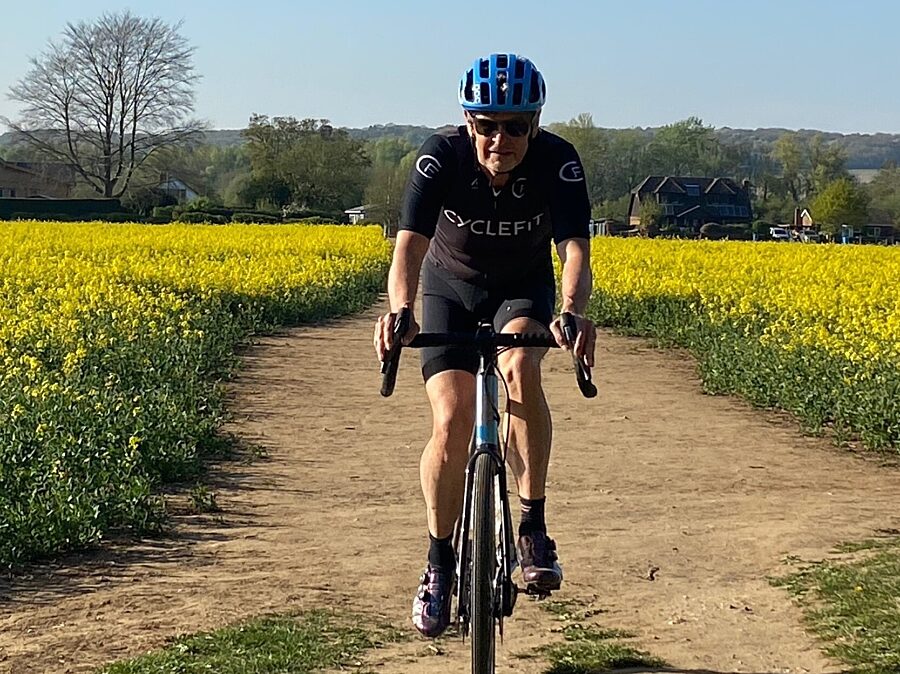"Understand. Don’t memorise. Learn Principles, not formulas"
Age shall not wither us... much
In the first of a series of articles on training through midlife and beyond, Phil Cavell ponders the nature of ageing and data
We are a society in love with data. For any modern cyclist – even midlife ones – concepts such as FTP, watts, watts per kilo, weight, BPM, metres climbed, Strava segments and how long it has taken us to traverse them today instead of yesterday have become part of our everyday thinking about riding a bike. Every pedal stroke and ride is metricated, recorded and presented like a PowerPoint for eventual cross-analysis.
In stark contrast, data was intrinsically dull when I was growing up. It was stored on mainframe computers in bunkers and sat in abstract to the real, vivid and actual world. ‘Data’ is even drab as a word.
Not anti-data
That’s not to say I’m anti-data – my job as a thoroughly modern bikefitter requires fluency in its language and application – but technology is something that we at Cyclefit have adapted and bent to our will, rather than something that we inherently venerate or rely upon. For me, technology is a case of ‘wouldn’t this be nice?’ rather than one of ‘I just can’t cope without it’. A camera that fires at 60 frames per second (fps) versus the human eye, which routinely works at 10-12fps, can be mighty handy when looking at a client’s complicated and confused ankling patterns. But arguably more important is a deep knowledge of their personal injury history, rehab and plausible motor-patterning compensations. Actually, to tell the truth I am a little bit anti-data. Or at least I’m anti data for data’s sake. Numbers are meaningless unless we pipe in
the lifeblood of context and understanding, which requires critical thinking.
"Numbers are meaningless unless we pipe in the lifeblood of context and understanding, which requires critical thinking"
Our ancient genes
The purpose of this column, and of my book The Midlife Cyclist, is to question some of the beliefs, principles and assumptions that are consciously or unconsciously held around bikes, cycling, fitness and health as we age. My aim is to facilitate deeper and hopefully more rational insights that can then be used to modify our behaviour in order to achieve the holy triumvirate of increased health, performance and longevity.
Challenging Assumptions
The first assumption for us to test is on the subject of ageing, and more specifically: are we young people who occasioned to get old or are we fundamentally altered on a cellular level by the maturing process? A recent study by BioMed Central found that just over a third of UK adults in their forties had two or more underlying and chronic health issues, such as high blood pressure, type 2 diabetes, arthritis and so on. In their forties! These people are so young they barely make it into the ‘midlife’ group. Lifestyle obviously plays a big role in such statistics but we also cannot escape the destiny contained in our genes and their unbroken links to our ancestors.
Stick a pin almost anywhere on the human existence timeline and the life expectancy for most of our ancestors would be a disappointing 20 to 30 years. In fact it was only as recently as the 1920s that we reached a point where we had even a fighting chance of surviving to an average age of 50 – the target demographic of this column.
"Stick a pin almost anywhere on the human existence timeline and the life expectancy for most of our ancestors would be a disappointing 20 to 30 years."
Two conclusions arise immediately: we are highly evolved to suit our ancestral environment, where lightweight carbon bicycles don’t feature heavily and FTP is irrelevant; and in that ancestral environment we would combat disease and malnutrition every single day, endeavouring to last into our third decade of life, which would hopefully correspond with our offspring’s emerging independence. We may be adapted to live to 30, but not to 40, 50, 60 and beyond. The new millennium has witnessed a revolt, however – a new generation of athletes in midlife and older seeking increased performance and health with advancing years. The problem is that in many instances the research doesn’t yet exist as to how our bodies react to being performance-tested at an age when we would almost certainly be dead in any other century.
Performing in a vacuum
A vacuum of definitive science requires a forensic trawl through existing studies, as well as a conversation with someone who will likely be shining a light in the right direction, be they a cardiologist, endocrinologist, pro team
physician or nutritionist, for example. We will meet all of these people in future columns. Exercise may well be the finest drug the pharmaceutical industry never invented, but can we also have too much of a good thing? Should the ideal prescription dose change as we age? And is the advice different for new and returning exercisers compared to lifelong athletes? These questions will be examined next issue. As a last word on data, I’ll leave you with this thought: we may well demand ever more accurate ways to record, slice and dice our training metrics, but every data set is just an abstract house of cards without the solid foundations provided by a deep understanding of biology and psychology, how it is changing over time and how that relates to you and your life.
That’s what we’ll be exploring in the months to come.
Phil Cavell is co-founder at Cyclefit in London. His book The Midlife Cyclist is published by Bloomsbury
This Column was first published in Cyclist Magazine - January 2022 and is re-printed here with their kind permission.
"Exercise may well be the finest drug the pharmaceutical industry never invented, but can we also have too much of a good thing?"


